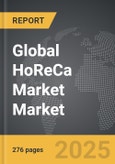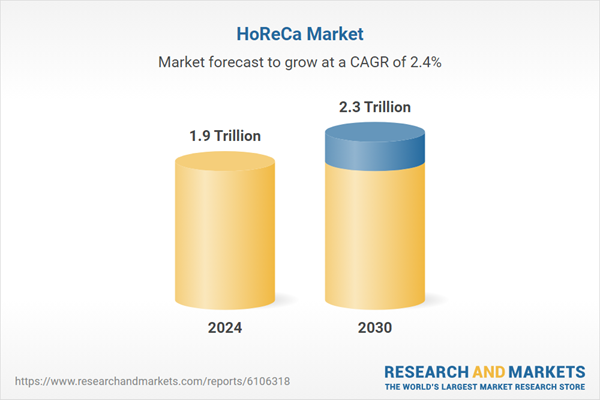Global HoReCa Market - Key Trends & Drivers Summarized
How Is the HoReCa Sector Adapting to Evolving Consumer Preferences in a Rapidly Changing World?
The HoReCa sector, which encompasses hotels, restaurants, and catering services, is undergoing a significant transformation as it responds to rapidly changing consumer preferences and lifestyle trends. One of the most noticeable shifts is the rising demand for unique dining and hospitality experiences that prioritize personalization, sustainability, and convenience. Modern consumers are increasingly valuing authenticity, local sourcing, and health-conscious menus, which has led many operators to revamp their offerings to align with these expectations. Restaurants are incorporating organic, plant-based, and allergen-free items to appeal to health-focused patrons, while hotels are redesigning amenities and food services to reflect more eco-friendly practices. The surge in food delivery and takeaway culture has also impacted the traditional HoReCa model, compelling restaurants and caterers to invest in packaging, digital ordering platforms, and partnerships with third-party logistics providers. Hospitality venues are integrating mobile apps for contactless check-ins, digital room service, and personalized guest experiences. At the same time, there is a growing appreciation for experiential dining, including chef-led tasting menus, immersive themed events, and fusion cuisines that cater to adventurous tastes. Social media is playing a critical role in shaping consumer decisions, making visual presentation and customer reviews crucial to business success. These evolving preferences are not merely trends but reflect deeper societal shifts in how people consume food, seek comfort, and engage with brands. Consequently, businesses across the HoReCa spectrum are reimagining operations to stay competitive in this fast-changing environment, turning customer-centric innovation into a strategic priority.What Role Is Technology Playing in Reshaping the Future of the HoReCa Industry?
Technology is revolutionizing the HoReCa industry by enabling more efficient operations, enhancing customer engagement, and offering new revenue streams. From the front of house to back-end logistics, digital tools are being adopted at unprecedented rates to improve service delivery and streamline processes. Restaurants are using AI-powered inventory management systems to reduce waste and manage supply chains more effectively. Point-of-sale (POS) systems are now integrated with customer relationship management software, allowing businesses to gather data on dining habits, preferences, and feedback in real time. Hotels are embracing smart room technologies that allow guests to control lighting, temperature, and entertainment systems through mobile apps or voice-activated assistants. In catering, automation is being used to simplify food preparation and delivery, particularly in high-volume or institutional settings. Augmented reality is beginning to find a place in customer-facing applications, enabling virtual menu previews or immersive booking experiences. Contactless payment and ordering systems have become standard across many establishments, reflecting consumer demand for safety, speed, and convenience. In addition to improving efficiency, technology is helping businesses respond quickly to market changes, manage labor shortages, and operate with greater transparency. For example, blockchain technology is being explored for tracking food provenance, enhancing trust in sourcing and safety. With digital transformation now central to the HoReCa landscape, companies that effectively leverage innovation are positioning themselves for sustained growth and customer loyalty. These advancements are not only helping businesses adapt to present challenges but are also setting the foundation for a more agile and resilient industry in the future.How Are Sustainability and Ethical Practices Influencing Operational Strategies in HoReCa?
Sustainability and ethical business practices have become central to strategic planning across the HoReCa industry, driven by heightened consumer awareness and regulatory pressures. More customers are prioritizing establishments that demonstrate environmental responsibility, whether through energy-efficient infrastructure, waste reduction initiatives, or the use of biodegradable packaging. Restaurants and hotels are increasingly sourcing ingredients from local farms, reducing the carbon footprint associated with transportation, and supporting regional economies. Many operators are transitioning to zero-waste kitchens and implementing composting programs to address the significant issue of food waste. Water conservation, energy management, and the use of renewable energy sources are being woven into facility design and daily operations. Beyond environmental concerns, ethical sourcing and labor practices are under greater scrutiny. Guests and diners are now more likely to choose brands that uphold fair trade standards, provide equitable working conditions, and support community welfare initiatives. This has led to the rise of corporate social responsibility programs within the HoReCa sector, with many businesses publishing sustainability reports and pledging to meet global goals such as those set by the United Nations. Plant-based menus are expanding not only for health reasons but also to reduce the ecological impact of meat and dairy production. Additionally, partnerships with non-profit organizations and sustainability certifiers are lending credibility to these initiatives. As sustainability becomes a defining element of consumer decision-making, hotels, restaurants, and caterers are recognizing that environmentally and socially responsible operations are no longer optional but essential for long-term viability and brand integrity.What Core Factors Are Driving the Global Growth of the HoReCa Market?
The growth in the HoReCa market is being driven by a convergence of demographic trends, economic expansion, lifestyle shifts, and urbanization. As middle-class populations grow in emerging economies, there is increased disposable income available for dining out, travel, and event-based services, which directly boosts demand across all HoReCa segments. Urbanization is leading to denser cities with higher concentrations of consumers looking for convenience, entertainment, and hospitality experiences close to home or work. This urban shift is encouraging the development of fast-casual restaurants, boutique hotels, and co-working spaces that integrate food and beverage services. The rise in tourism, both domestic and international, is another strong contributor, prompting the construction of new hotels, resorts, and supporting culinary services in popular travel destinations. Demographically, younger generations are placing greater value on experiences over material possessions, which is driving interest in dining events, culinary tourism, and unique accommodations. Meanwhile, corporate demand for event catering and business travel is sustaining growth in the catering and hotel sectors. Government initiatives aimed at promoting tourism and local food culture are creating further momentum through subsidies, promotional campaigns, and infrastructure development. Additionally, franchising models are allowing restaurant and hotel chains to scale rapidly while maintaining consistency and brand identity. Digital marketing, loyalty programs, and online booking platforms are expanding customer reach and retention. These combined factors are reinforcing a strong and resilient growth trajectory for the HoReCa industry, establishing it as a dynamic and evolving pillar of the global service economy.Report Scope
The report analyzes the HoReCa market, presented in terms of market value (US$). The analysis covers the key segments and geographic regions outlined below:- Segments: Type (HoReCa Single Outlets, HoReCa Chains); Service Type (Eateries & Restaurants, Hotels, Cafes & Pubs).
- Geographic Regions/Countries: World; United States; Canada; Japan; China; Europe (France; Germany; Italy; United Kingdom; Spain; Russia; and Rest of Europe); Asia-Pacific (Australia; India; South Korea; and Rest of Asia-Pacific); Latin America (Argentina; Brazil; Mexico; and Rest of Latin America); Middle East (Iran; Israel; Saudi Arabia; United Arab Emirates; and Rest of Middle East); and Africa.
Key Insights:
- Market Growth: Understand the significant growth trajectory of the Single Outlets segment, which is expected to reach US$1.5 Trillion by 2030 with a CAGR of a 2.9%. The Chains segment is also set to grow at 1.4% CAGR over the analysis period.
- Regional Analysis: Gain insights into the U.S. market, valued at $531 Billion in 2024, and China, forecasted to grow at an impressive 4.6% CAGR to reach $429.4 Billion by 2030. Discover growth trends in other key regions, including Japan, Canada, Germany, and the Asia-Pacific.
Why You Should Buy This Report:
- Detailed Market Analysis: Access a thorough analysis of the Global HoReCa Market, covering all major geographic regions and market segments.
- Competitive Insights: Get an overview of the competitive landscape, including the market presence of major players across different geographies.
- Future Trends and Drivers: Understand the key trends and drivers shaping the future of the Global HoReCa Market.
- Actionable Insights: Benefit from actionable insights that can help you identify new revenue opportunities and make strategic business decisions.
Key Questions Answered:
- How is the Global HoReCa Market expected to evolve by 2030?
- What are the main drivers and restraints affecting the market?
- Which market segments will grow the most over the forecast period?
- How will market shares for different regions and segments change by 2030?
- Who are the leading players in the market, and what are their prospects?
Report Features:
- Comprehensive Market Data: Independent analysis of annual sales and market forecasts in US$ Million from 2024 to 2030.
- In-Depth Regional Analysis: Detailed insights into key markets, including the U.S., China, Japan, Canada, Europe, Asia-Pacific, Latin America, Middle East, and Africa.
- Company Profiles: Coverage of players such as Aegerion Pharmaceuticals, Accord Healthcare, Aegerion Pharmaceuticals, Alnylam Pharmaceuticals, Amgen Inc. and more.
- Complimentary Updates: Receive free report updates for one year to keep you informed of the latest market developments.
Some of the 42 companies featured in this HoReCa market report include:
- Accor S.A.
- Best Western Hotels & Resorts
- Booking Holdings Inc.
- Compass Group PLC
- Domino's Pizza Inc.
- Four Seasons Hotels and Resorts
- Hilton Worldwide Holdings Inc.
- Hyatt Hotels Corporation
- InterContinental Hotels Group PLC (IHG)
- Jollibee Foods Corporation
- Marriott International, Inc.
- McDonald's Corporation
- NH Hotel Group
- Papa John's International Inc.
- Radisson Hotel Group
- Restaurant Brands International
- Shake Shack Inc.
- Starbucks Corporation
- Whitbread PLC
- Yum! Brands, Inc.
This edition integrates the latest global trade and economic shifts into comprehensive market analysis. Key updates include:
- Tariff and Trade Impact: Insights into global tariff negotiations across 180+ countries, with analysis of supply chain turbulence, sourcing disruptions, and geographic realignment. Special focus on 2025 as a pivotal year for trade tensions, including updated perspectives on the Trump-era tariffs.
- Adjusted Forecasts and Analytics: Revised global and regional market forecasts through 2030, incorporating tariff effects, economic uncertainty, and structural changes in globalization. Includes historical analysis from 2015 to 2023.
- Strategic Market Dynamics: Evaluation of revised market prospects, regional outlooks, and key economic indicators such as population and urbanization trends.
- Innovation & Technology Trends: Latest developments in product and process innovation, emerging technologies, and key industry drivers shaping the competitive landscape.
- Competitive Intelligence: Updated global market share estimates for 2025, competitive positioning of major players (Strong/Active/Niche/Trivial), and refined focus on leading global brands and core players.
- Expert Insight & Commentary: Strategic analysis from economists, trade experts, and domain specialists to contextualize market shifts and identify emerging opportunities.
Table of Contents
Companies Mentioned (Partial List)
A selection of companies mentioned in this report includes, but is not limited to:
- Accor S.A.
- Best Western Hotels & Resorts
- Booking Holdings Inc.
- Compass Group PLC
- Domino's Pizza Inc.
- Four Seasons Hotels and Resorts
- Hilton Worldwide Holdings Inc.
- Hyatt Hotels Corporation
- InterContinental Hotels Group PLC (IHG)
- Jollibee Foods Corporation
- Marriott International, Inc.
- McDonald's Corporation
- NH Hotel Group
- Papa John's International Inc.
- Radisson Hotel Group
- Restaurant Brands International
- Shake Shack Inc.
- Starbucks Corporation
- Whitbread PLC
- Yum! Brands, Inc.
Table Information
| Report Attribute | Details |
|---|---|
| No. of Pages | 276 |
| Published | February 2026 |
| Forecast Period | 2024 - 2030 |
| Estimated Market Value ( USD | $ 1.9 Trillion |
| Forecasted Market Value ( USD | $ 2.3 Trillion |
| Compound Annual Growth Rate | 2.4% |
| Regions Covered | Global |









